Deus Ex Human Revolution preview: first hands on
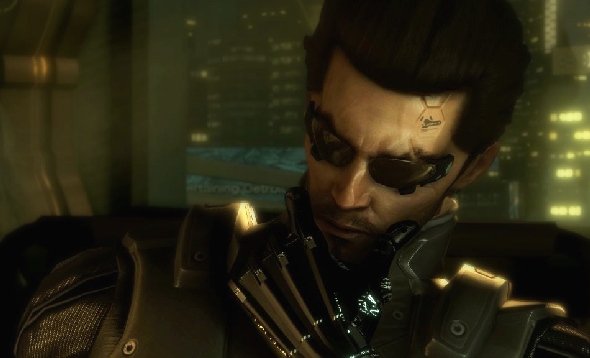
I'm at a gloomy club in London which emits a speech bubble saying "Stay away!" if you hover over it on Google Maps. I'm ignoring this customer review, because that guy probably wasn't here when the place was full of machines running Deus Ex: Human Revolution, when the music was probably less exciting than the ominous synth purr of the game's ambient cyberpunk soundtrack, and before giant images of Sarif Industries' prosthetic eyes were projected onto every wall.
In case there was any way I could be more excited, the difficulty selection screen goes out of its way to make me grin:
- Casual
- Normal
- Deus Ex
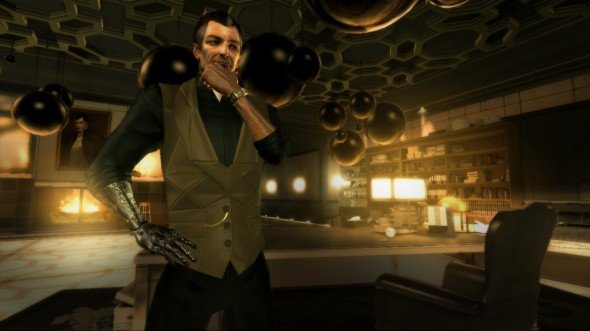
I'd usually go for Normal mode if I'm going to be writing about something - it makes any difficulty complaints fair. And because the PC version isn't ready for us to play, I'm on an Xbox 360 rather than a mouse and keyboard. That means my manual dexterity will be slightly lower than that of my only surviving grandparent. But if you call one of your difficulty modes Deus Ex, of course I have to pick that one.
Deus Ex was an action RPG that looked like a shooter. Its genius was giving you a large number of tools to manipulate your environment, then making sure the most obvious one - using guns to shoot people - was often prohibitively difficult. It didn't just let you get creative, it forced you to be. The big question is whether its prequel Human Revolution will too, and the only way to know is by playing it.
I wasn't expecting the game to be so balls-out about its hardcore roots - "Would you like to play on Normal, sir, or would you like to actually play the game?" But by the end of the three hours I spent playing it, I realised that's a common theme. Plenty is different to the original Deus Ex, plenty is more accessible, and plenty is more cinematic. But it's still a game that slaps you in the face for trying to play it like Quake.
The intro is a very conscious nod to Deus Ex's: several mysterious conspirators ask each other uselessly vague questions like "Is everything in place?" All that's clear from the conversation is that they're about to do something to prevent cybernetics corp Sarif Industries from revealing a scientific discovery they've made relating to human augmentation.
Cut to you, head of security at Sarif, currently protecting the scientist who made that discovery. Who also happens to be your ex girlfriend.
The biggest gaming news, reviews and hardware deals
Keep up to date with the most important stories and the best deals, as picked by the PC Gamer team.
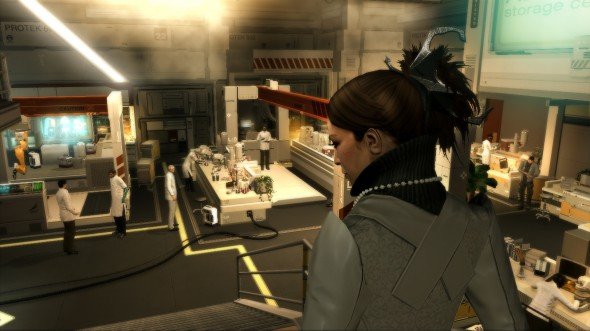
The very first interactive scene of Human Revolution captures both the cleverness and the absurdity of the original: there's a whole second layer to the plot to be discovered by snooping around your ex Megan's office - reading her private data pads, logging onto her computer and going through e-mails about everything from corporate secrets to who's going to look after her dog while she's away. All while she stands by the door waiting to present the most important scientific discover of a generation to the Washington.
Naturally, I read every word. If you don't jump on someone's desk and read their private e-mails while they watch, you're not really playing in Deus Ex mode.
Even in that one room, the second layer of story you can discover gives a new twist to the premise of the game - skip this paragraph if you'd rather find out for yourself when the game comes out later this year.
Meg's discovery was made during tests on a Patient X, someone whose identity Meg is terrified of ever revealing to the outside world. X appears to be a human whose physiology suggests he's a few steps further down the evolutionary chain than the rest of us, and studying him led Meg and her team to a way to get the human body to accept artificial augmentation more readily. Augs are already rife in the world of Human Revolution, but those with the money and time to undergo the drastic surgery eventually find their bodies reject the implants. Expensive anti-rejection drugs are required for the rest of their lives - any way to bypass that consequence would be the last step in making augmentation mainstream. That's the human revolution of the title.
Obviously you're attacked - it wouldn't be much of a set up to the game if you weren't. But while there are strong anti-augmentation movements in the story, the leaders of the assault are augmented themselves. Something else is going on here.
The attackers are systematically slaughtering all of Sarif's scientists, and you're sent down - with the elevator code 0451, familiar to any Deus Ex or System Shock fan - to stop them. While you do play this section, it's best seen as backstory: you pull out an assault rifle whether you like it or not, and since you're not yet augmented, that's essentially your only combat option in the few sequences ahead.
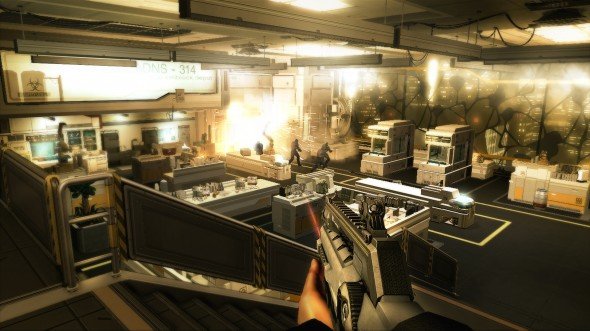
The rest of the game takes place six months later, and from what I've seen it doesn't force you to use one approach like this again. In general, Human Revolution's levels are open, multi-path, and can be completed by avoiding enemies entirely. There's even an achievement for getting through a level without being seen: Ghost. And your equipment and augs are completely up to you: you don't get so much as a pistol unless you specifically ask for it or take one from an enemy.
Whether you play stealthily, aggressively or both, combat in Human Revolution is all about cover. If you're trying to avoid being spotted, you stick to cover as much as possible. If you've been spotted and you're trying to avoid being shot to death, you stick to cover as much as possible. The two play styles require a different pattern of thought, but they're driven by the same neat system.
Pressing the cover button makes you hug the nearest wall or barrier, and switches to third person to let you see what you're hiding from. The switch of perspective isn't jarring in itself: when you know what wall you're gluing yourself to, it feels natural and useful to be able to see exactly where you are and beyond. But the sections I played were intricate and full of little corners, and on several occasions I stuck to a bit of cover I didn't plan to. When your perspective changes to show you in a place you didn't think you were going, that is confusing. Whether it'll still be a problem when playing with the speed and precision of a mouse I don't know. I can say the same system works perfectly in Rainbow Six Vegas, but that may be because Vegas's levels are simpler geometrically.
The good news is that you're never stuck in cover longer than you want to be: you have to hold the button to stay hidden, so the moment you release it you're back in the action. Edging out and moving to new cover is handled beautifully too - move to the edge and keep pressing the direction you want to lean out, and you don't have to worry about accidentally rounding the corner into fire. If you do want to do that, you hold the jump button to slide smoothly around. If there's another piece of cover in action-movie-commando-roll range, tapping jump makes you dive to it and come up in a perfect crouch behind it. And not just at preset points - even if the cover is an object you moved there yourself, Jensen executes the just the right move to reach it exactly.
In fights, that looks cool. When you're sneaking, it's cooler still. Doing a forward roll from one desk to the next in the split second a guard looks away is thrilling. There's a little tolerance to their detection: if someone does turn suddenly and catches a glimpse of you, they don't open fire or call other guards, they just wander over to investigate in their own time. You can usually creep quietly away and be on the other side of the room by the time they get there.
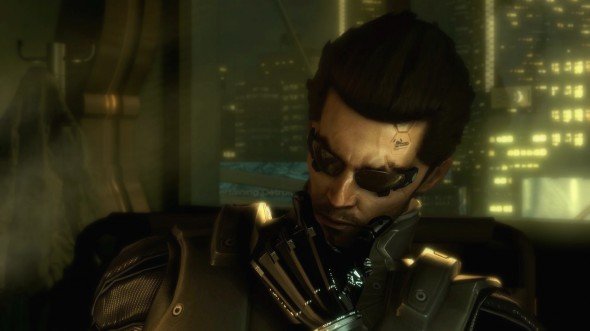
That's appreciated. On Deus Ex difficulty, you die almost instantly under fire. If a bullet only scrapes you, it takes around thirty seconds to recover from the hit. Even on Normal, which I eventually resorted to at one difficulty spike towards the end of my time, health doesn't regenerate for a significant time after you're shot. It feels much more serious than a Call of Duty gunshot wound, despite the fact that no-one throws jelly in your eyes to obscure your vision.
Almost everywhere you fight is a multi-layered space: there's always some vertical variation, whether it's stairs or a sheer drop. The open spaces are littered with things to hide behind: tables, cabinets, and our eternal friend the crate. It makes the strategy of how you deal with the enemies in these areas more interesting than in, say, Mass Effect 2 - another cover-based action RPG.
Your enemies roam that space with admirable moxy. Unless you're going for an unusually shooty approach, you spend most of your time crouched behind stuff watching them patrol, and they do it in a rather interesting way. There don't seem to be set routes to learn, they explore of their own accord and often vary their behaviour - particularly once they're alerted.
My first fight was also my first death - I crouched behind a house plant while two attackers crept down some steps, waited until I was level with one and attempted to knock him out with a non-lethal takedown. The button did nothing, and the two gunned me down in a second. Turns out you can't actually do melee takedowns until you get your robot arms at the end of this intro sequence. So next time, I crouched behind that same plant and waited for the guard to come close enough to catch a faceful of blind fire from my assault rifle. But this time, both guards turned right at the bottom of the stairs and searched the room in a different pattern. Luckily, that new pattern took them both past a conspicuously green canister, so I shot that instead and scampered up the stairs while they both choked on toxic gas.
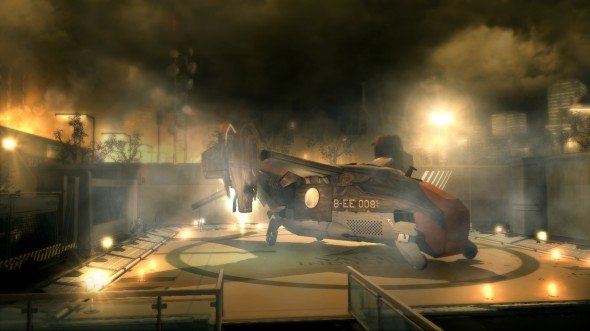
If they do catch sight of you, the way guards behave depends on what they know. If they're not sure where you are, they search the area cautiously and tell their friends to stay alert. If they've seen you clearly or heard you fire, they all move to cover and shoot to suppress you. Once when I tried to take potshots from a high vantage point, two of them split off without my noticing, circled around me, found a door to my hiding spot and came in from behind.
That stuff is the payoff for an AI system that's clearly dynamic and adventurous in the way it navigates the levels. The cost, right now, is that they sometimes behave stupidly under pressure. Enemies sometimes bunched up at doorways without going through. Another time, on Normal, a guard failed to kill me as I fumbled ineptly with the controller trying to melee, gave up, then went through a door. As soon as it shut behind me, the guard blurted "Where did he go?" The cupboard, dude, you just watched me shut myself in a cupboard.
It's too soon to call, but I wouldn't be surprised if these behavioural anomalies were still around in the finished game. On balance, I don't have a problem with it. I'd rather have experimental AI that can surprise me in good ways and bad than AI that doesn't surprise at all. The first Deus Ex's guards were hardly convincing, the important thing was that their inadequacies left openings for creative tactics and tense moments. Human Revolution's may well do the same.
At the end of the opening half hour, the credits roll over a montage of Jensen getting his augmentations - a sequence extremely similar to the opening of Mass Effect 2, but exciting nonetheless. I played for another two and a half hours, but all that stuff is embargoed until the 24th of February. We'll have another hands on to spill all the juicy details then.
What I can tell you is that I left slightly shellshocked by how punishing it feels, heartened by how like the original it is, and more excited than ever to play it on PC, where it clearly belongs.
Other thoughts:
- Played on a large 1080p television a few feet away, the lovely art style is marred slightly by some jaggedness. Presumably we'll be able to fix that by cranking up the anti-aliasing on PC.
- The assault rifle feels fine - certainly better than the first game's. But if this were a straight cover shooter, the feel of the combat alone wouldn't be enough to interest me.
- The levels are littered with datapads (useful information), pocket secretaries (vital information like keypad codes), and e-zines (nicely designed news journals with lots of info on current affairs and local colour). There's masses to read in this game.
- You type in codes and security logins manually - kind of tedious on a console, but perfect for that hacker feel on PC.
- It's one of those games where you can use almost everything - turn on taps, flush urinals, pick up plants and throw them at people. NPCs don't react to stuff hitting them in the head, unless of course it's big enough to maim them.
- Some of the hard parts, and the process of experimenting with the game, were made more frustrating by a savegame corruption problem with this early code. After losing my progress about 12 times, I finished the demo a little less giddy than I would have been from the game alone. That's pretty normal from early code, it doesn't suggest any problems with the final game.
- We've also just received a new trailer - check it out.

